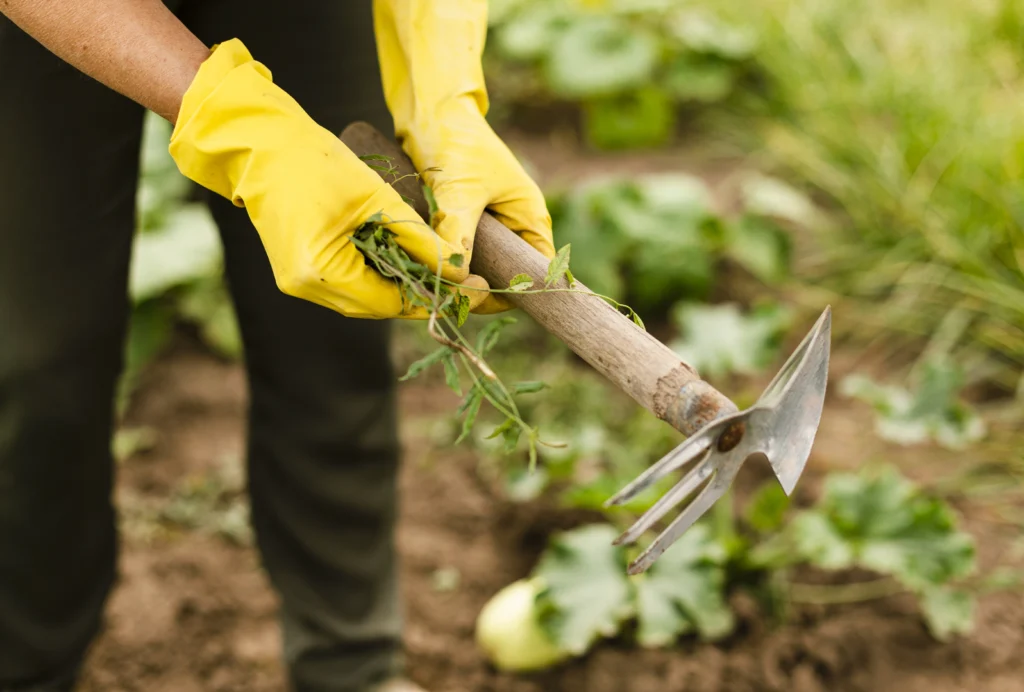Contents Guide
Your garden is more than just a collection of plants—it’s a peaceful retreat where you grow fresh produce, nurture flowers, and enjoy nature. However, unwanted pests can quickly turn your green space into a battleground, damaging plants and reducing yields.
The good news? You don’t need harsh chemicals to keep your garden pest-free. According to a study by the National Gardening Association, 60% of gardeners use eco-friendly pest control methods like companion planting and introducing beneficial insects. By keeping your garden clean, rotating crops, and encouraging ladybugs and praying mantises, you can naturally control pests. Companion planting, such as growing basil near tomatoes, deters harmful bugs.
With these sustainable techniques, you can enjoy a thriving, pest-resistant garden while maintaining a healthy ecosystem, and keep your plants flourishing.
We’ll cover natural pest control for your garden, hygiene tips, and eco-friendly pest prevention techniques to keep your plants thriving.
Identifying Common Garden Pests
Before you can address pests in your garden, you first need to know what you’re up against. Here’s a quick rundown of the most prevalent garden pests:
Aphids
- Tiny, pear-shaped insects that suck sap from plants, weakening them.
- These pests are often found on plants like roses, vegetables, and fruit trees.
Slugs and Snails
- Leave large holes in leaves and damage seedlings.
- Favor cool, damp conditions and plants close to the ground.
Whiteflies
- Small, moth-like insects that gather on the underside of leaves.
- Harm plants by sucking sap and spreading diseases.
Caterpillars
- Voracious eaters that chew holes in leaves and vegetables.
- Frequently target leafy greens and brassicas like kale and broccoli.
Spider Mites
- Tiny pests that cause yellowing and mottling of leaves.
- Often appear during hot, dry weather on plants like tomatoes and beans.
Identifying these pests early is your first defense in maintaining effective pest control for gardens.
Natural Pest Prevention Techniques
Prevention is better than cure, especially when it comes to garden pests. By focusing on natural pest control for your garden, you can create an environment that discourages unwanted visitors without disrupting the ecosystem.
1. Companion Planting
Companion planting is an age-old technique where specific plants are grown next to each other for mutual benefit. Certain plants can repel pests, while others attract beneficial insects.
- Marigolds deter nematodes and aphids.
- Basil repels flies and mosquitoes when planted near tomatoes.
- Nasturtiums attract aphids, keeping them away from your prized plants.
2. Introduce Beneficial Insects
Not all bugs are bad! Many insects prey on garden pests, keeping their populations in check.
- Ladybugs love aphids.
- Lacewings can help control whiteflies and caterpillars.
- Praying mantises feed on a range of pests like grasshoppers and beetles.
You can attract these helpful insects by planting their favorite flowers, like daisies, fennel, or dill.
3. Use Natural Deterrents
Many household items can double as effective pest deterrents.
- Garlic Spray: Blend garlic cloves with water and spray on plants to deter aphids and slugs.
- Neem Oil: A natural oil that disrupts the reproduction of harmful pests without harming beneficial insects like bees.
- Diatomaceous Earth: Sprinkle around your plants—it’s abrasive to pests but safe for people and pets.
4. Maintain Healthy Soil
Healthy soil leads to stronger plants that can naturally resist pests.
- Add compost to enrich soil nutrients.
- Rotate crops seasonally to reduce pest buildup.
- Use mulch to suppress weeds and deter insects.
5. Keep Your Garden Clean
A tidy garden discourages pests from settling in.
- Remove dead leaves and weeds regularly.
- Trim overgrown plants to improve airflow.
- Clear out plant debris where pests might hide.
By following these natural techniques, you can keep your garden healthy and pest-free without relying on harmful chemicals.

Maintaining Garden Hygiene
A healthy garden is less likely to attract pests. Simple maintenance habits can go a long way in preventing pest infestations.
1. Prune Regularly
Removing dead leaves, branches, or flowers eliminates hiding spots for pests and prevents infestations before they start. Regular pruning also promotes new growth and helps plants focus their energy on producing healthy leaves and fruit.
2. Control Watering
Overwatering creates a moist environment perfect for slugs and snails, while dry soil can stress plants, making them more vulnerable to pests. Water in the morning to allow soil to dry throughout the day, reducing fungal diseases and keeping plants strong.
3. Clean Debris
Fallen leaves and rotting produce can harbor pests and spread diseases, creating an unhealthy environment for your plants. Clear garden waste regularly or add it to your compost pile to recycle nutrients while keeping pests at bay.
4. Rotate Crops
If you’re growing vegetables, changing their location each season can prevent soil depletion and disrupt the life cycle of pests that target specific plants. This practice also improves soil health and reduces the risk of plant diseases building up over time.
Sustainable Pest Control Solutions
If pests still invade despite your efforts, sustainable pest control methods can help without harming the environment.
1. Non-Toxic Commercial Products
Many eco-friendly pest control products are now available. Look for solutions with ingredients safe for humans, pets, and pollinators. Products like insecticidal soaps and plant-based sprays are designed for targeted pest control without disrupting the ecosystem.
2. Homemade Remedies
DIY pest deterrents can be highly effective while keeping costs low. Popular options include:
- Soap and Water Spray to combat aphids and whiteflies.
- Chili Spray made from crushed chili peppers to deter caterpillars and slugs.
- Beer Traps to catch and eliminate slugs and snails from your garden.
3. Floating Row Covers
These lightweight fabric covers create a physical barrier between pests and your plants while still letting sunlight and water through. They’re useful for protecting leafy greens, preventing bugs from laying eggs on your crops.
Conclusion
Creating a pest-free garden doesn’t require harsh chemicals or harmful pesticides. By adopting natural and sustainable pest control methods, you can protect your plants while preserving the environment. Simple practices like companion planting, introducing beneficial insects, using natural deterrents, and maintaining garden hygiene can significantly reduce pest infestations.
A thriving, pest-resistant garden is built on balance—healthy soil, clean surroundings, and a diverse ecosystem that encourages natural predators. Sustainable solutions like homemade remedies, non-toxic commercial products, and floating row covers offer effective ways to keep pests at bay without disrupting nature.
By embracing these eco-friendly techniques, you not only safeguard your plants but also contribute to a healthier, more resilient garden. With patience and consistency, you can enjoy a lush, productive garden free from unwanted pests—naturally and sustainably.
FAQs
Implement companion planting, maintain clean garden beds, and use non-toxic deterrents like neem oil to keep vegetable gardens pest-free.
Healthy gardening habits like proper watering, pruning, and using organic deterrents work best to prevent bugs naturally.
Yes! Strategies like introducing beneficial insects and using homemade sprays are highly effective and environmentally friendly.
Neem oil effectively repels and disrupts pests like aphids, whiteflies, and spider mites without harming beneficial insects.
By using natural and targeted pest control methods, you can avoid harming helpful pollinators like bees and butterflies while keeping your garden healthy.



 Pest Prevention Tips
Pest Prevention Tips